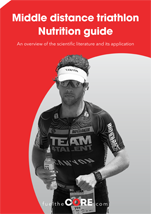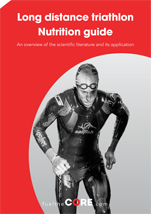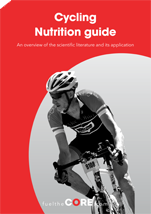Nutrition training guide 2017
Nutrition preparation starts weeks before your event.
Nutritional Training
We all know we shouldn’t run a marathon race in brand new shoes. And we know we shouldn’t ride a major road race on a shiny new saddle. Likewise, it’s not a good idea to try your new nutrition plan on race day.
There are a number of reasons why nutritional training and practicing all aspects of your nutritional plan are important.
First, there are adaptations that take place in the gut that will help you to absorb more with greater stomach comfort. Second, it is also important to practice the mechanics of the nutrition plan... perhaps carrying some products, opening wrappers and containers, sipping, sucking, chewing, swallowing... while on the run or while only slowing briefly. Or if you decide that your tactic is to stop at feed stations and take the time to consume enough, this stopping and starting needs to be trained as well. I am sure this was a well rehearsed routine for Jan Frodeno who used this tactic when he ran to his first Ironman World Champion title in 2015.
Training the gut is like training the muscle
Training the gut is like training the muscle. It takes time and it needs careful planning. Also, if you avoid certain nutrients, you may actually “detrain” the gut. For example those athletes who are restricting their carbohydrate intake or restricting their energy intake may place themselves at a disadvantage during a race because the gut will not be trained to handle carbohydrate.
How often do you need to train the gut?
You will actually train the gut on a daily basis. Every time you eat, this is like training. Days with high carbohydrate intake are good to train the body to absorb carbohydrate. But this is only part of what needs to be done. This does not mean that you can also absorb it during exercise. Therefore, carbohydrate intake during exercise also needs to be trained. There is little research or data about how long it takes humans to adapt, but there are indications that you can expect improvements already within a few days. We recommend to pick one day a week for your nutritional training. Pick a day with a long training session/workout (similar to the race). Ideally the intensity is not too low either. For many endurance athletes this is often the Saturday run or the Saturday ride, but you could of course pick any other day of the week.
How much do I need to take?
During this training try to mimic the carbohydrate intake you are planning to do in your race. Initially you may have to start a little lower depending on how high your target is and what you are used to. If you have never run 10k, your first run would not be a 10k. It would be a shorter run and every week you would build up. Similarly, you should build up towards achieving your target race intake. The weeks before the race, you may even go beyond the planned intake.
How long before my race do I start?
Again, there isn’t research that shows exactly what works best, but we recommend to start at least 6 weeks and ideally 10 weeks before the event. This gives you plenty of time to experiment and to build up!
How to use CORE to train the gut?
Everything starts with planning your race. Carefully plan your race nutrition plan and know your target hourly intake. Next, start using a level of carbohydrate intake per hour that is slightly below this target. If this feels fine increase intake for the next training. If you have trouble taking in that amount, make sure you get used to that amount first before you increase it. It may also be necessary to consider other reasons why a level is not comfortable; is it a reaction to taste, consistency, allergens, mechanics of eating, etc. Adjust as necessary and gradually build up to your race nutrition plan. Once successfully there, then increase a little further beyond target if you can; it’s like speed work for your gut. Try to use the exact same products you will use in the race. If you use course nutrition, make sure you have this available for your training.
Use your CORE race nutrition plan to guide your carbohydrate intake. Fluid intake may have to vary a little depending on the weather conditions. For each nutritional training session, you can set your carbohydrate target (premium version only), and let app calculate your fluid needs. Note that Hydration should be set appropriately for the weather and intensity for that day.
After your training, go back to CORE and enter the intake exactly as it happened. Check to see if you hit the targets and take a few notes about how you felt. This will allow you to learn valuable lessons over time and dial in your nutrition plan.
Example:
| Week | Distance | Carb Target (g/h) | Notes | Hydration Target |
|---|---|---|---|---|
| -10 | 15 miles/ 24 km | 42 | Race Level | Effort specific |
| -9 | 13 miles/ 21 km | 42 | Race Level | Effort specific |
| -8 | 17 miles/ 27 km | 42 | Race Level | Effort specific |
| -7 | 18 miles/ 29 km | 42 | Race Level | Effort specific |
| -6 | 13 miles/ 21 km | 42 | Race Level | Effort specific |
| -5 | 20 miles/ 32 km | 42 | Race Level | Effort specific |
| -4 | 12 miles/ 19 km | 47 | > Race Level | Effort specific |
| -3 | 20 miles/ 32 km | 47 | > Race Level | Effort specific |
| -2 | 12 miles/ 20 km | 47 | > Race Level | Effort specific |
| -1 | 8 miles/ 13 km | 42 | Race Level | Effort specific |
| Race | 26 miles/ 42 km | 42 | Race Level | Effort Plan |
Warning
Race day is different than training days. On race day, anxiety will play a role and this can affect gut function. Also, the intensity may be a little higher than in training and the distance may sometimes be a bit longer. Because you will have trained with slightly more carbohydrate than you will use in the race, you will start the race with the knowledge that you will have prepared your gut as well as possible. And that will always be better than little or no preparation at all (which seems to be the default for many athletes). Have a great race!
We believe that the key to great performance can be found in planning and preparation. Train hard, fuel smart!
The team at CORE!
Author
Professor Asker Jeukendrup is a leading sports nutritionists and exercise physiologist who spent most of his career at the University of Birmingham (UK) and currently he is a visiting professor at Loughborough University. During his career Professor Jeukendrup authored over 200 research papers and book chapters...





